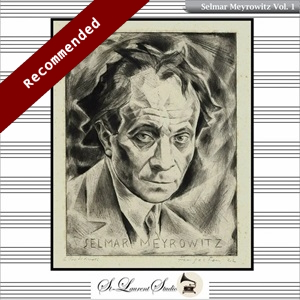
Franz Liszt (1811–1886)
Selmar Meyrowitz, Volume 1
A Faust Symphony (1854)
Les Préludes (1850-55)
Georges Jouatte (tenor)
Alexis Vlasoff Choir
Grand Orchestre Philharmonique de Paris; Grand Orchestre Symphonique/Selmar Meyrowitz
rec. 1934 & 1935 (A Faust Symphony), Paris, France
St Laurent Studio YSL 1336 78 [70]
If while hearing this recording of Liszt’s A Faust Symphony you suddenly catch a whiff of sulphur emitting from your speakers and feel the flames of eternal hellfire lapping at your back, don’t be frightened. Because in the fifty minutes preceding this work’s resplendent closing hymn to the “eternal feminine”, the conductor Selmar Meyrowitz sounds as if he himself was slugging it out with the denizens of the underworld.
Meyro-who? He was, unluckily, among those musicians of the interwar period whose tragic fate it was to be heaped onto the wreckage of his times. Already middle-aged by the time he became a stalwart of early German electrical recordings, the rise of the NSDAP forced him to seek refuge in France, where he died under the shadow of invasion in 1941. The most notable of Meyrowitz’s fleeting appearances on compact discs are a swinging reading of the Emperor Waltz on a Teldec compilation of vintage Johann Strauss, Jr. recordings (Telefunken Legacy 3984-28411-2). Also, an APR reissue of a recording of the Schubert-Liszt Wanderer Fantasy, where he partnered Edward Kilenyi (APR 7037). He has had a little more exposure on digital formats thanks to Pristine Classical: his recordings of Liszt’s A Faust Symphony and Schubert’s “Unfinished” were among that label’s early releases (PASC 032 and PASC 1340, respectively).
Collectors of 78 RPM discs have long prized the phonogenic presence Meyrowitz conveyed before studio microphones. You can hear that for yourself on this first, in what promises to be a series of reissues, from St. Laurent Studio devoted to the conductor. His 1935 recording of A Faust Symphony, the centrepiece of this release, bursts with the kind of passion commonplace and taken for granted in orchestral recordings of the conductor’s time, but rare in ours. A volatile performance of the “Faust” movement gives way to a beautifully poised “Gretchen”, whose undercurrent of tension is adorned by lovely solo string playing. Crisp rhythms and meticulously calibrated fluctuations of tempi and instrumental textures underline the cacodaemonic tumult of “Mephistopheles”, whose skulduggery is eviscerated in a beatific apotheosis that triumphs over everything, including this recording’s small cuts and rendering of Goethe’s text in French. On records, Alexander Gauk’s Soviet recording (last available on Melodiya MEL CD 10 02496) is the lone interpretation that approaches this one for dramatic power, although the Russian’s choice of the original ending over the revision is unfortunate.
Meyrowitz’s 1934 recording of Les Préludes may be an even more convincing example of his art. Artless as its taut sense of line, attentiveness to clear articulation of instrumental voices and uncontrived pacing seem on paper, the resulting interpretation is anything but. Revelatory, even explosive, only Willem Mengelberg (best heard on Opus Kura OPK2067 and Pristine Classical PASC595) and Hermann Scherchen (Westminster Legacy 289 471 237-2) can match Meyrowitz for sheer thrills. Stokowski’s Philadelphia Orchestra this ensemble is not, but their tangy sonority aptly complements Meyrowitz’s aim for timbral contrasts and transparency. More importantly, the orchestra—audibly roused to give their best—takes this much-battered warhorse and makes of it a virile, bucking, young rough stock.
St. Laurent Studio’s non-interventionist transfers are discernibly noisier than Pristine’s, which allows for the sound encoded on those shellac grooves to bloom. In Meyrowitz’s recording of A Faust Symphony, my preference is for the present release over Pristine, but I’m grateful to have both. Presentation, as usual from St. Laurent Studio, is limited to a track listing and essential discographical information. There are no liner notes; attribution of the vocal contribution by Georges Jouatte and the Alexis Vlasoff Choir in the coda of A Faust Symphony is missing.
Volume 2 in this Meyrowitz series can’t come soon enough.
Néstor Castiglione
Availability: St Laurent Studio

















